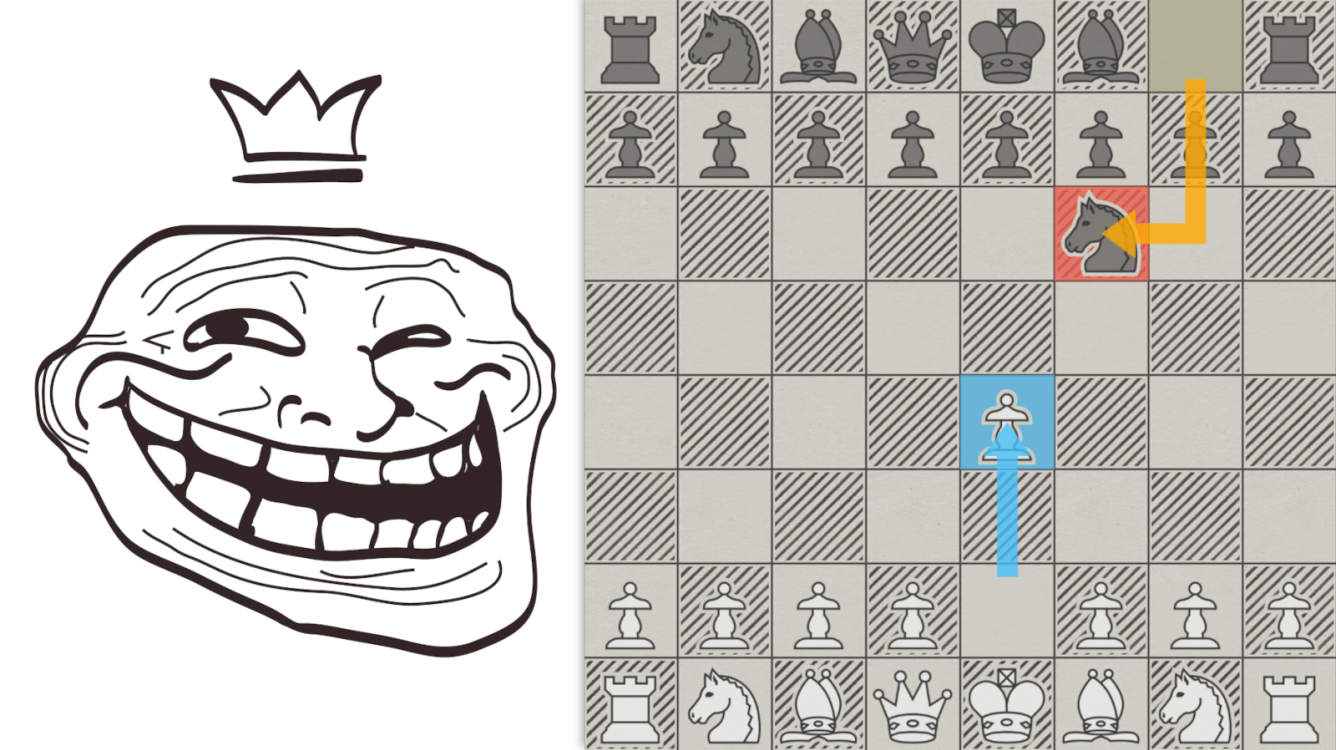
The Opening For Chess Trolls
Last week my student told me that his internet opponent played a weird opening. I wasn't surprised a bit since any opening that doesn't allow the Scholar's Mate is labeled as "weird" by this little kid. Yet, I was intrigued when he mentioned that Black managed to blunder a minor piece as early as move two. It is not that I have never seen anything like this. I will never forget a chess camp some 20 years ago where one of the kids played this:
I was absolutely dumbfounded since I couldn't find even the slightest point to this move. So I asked my colleagues at that camp, grandmasters Kaidanov and Kudrin, for a possible explanation. While GM Kudrin's idea that the poor kid had just learned the Ruy Lopez and simply played it in a wrong position sounds quite plausible, I personally prefer GM Kaidanov's theory. He suggested that it was a case of deep prophylaxis "a-la Mark Dvoretsky." Black wanted to play the Caro-Kann, and therefore White prevented his intention. Indeed, after 2...d5 3. exd5,Black cannot play 3...cxd5 since the pawn is pinned!
Now you can understand why I was so curious. Who knows, maybe this unknown internet guy had managed to prevent the Sicilian defense or some other major opening. The reality disappointed me since the game started like this: 1.e4 Nf6 2.e5 Ng4?? This wasn't even a novelty and has happened in a grandmaster's game before:
I explained that 1...Nf6 is a well-known move and this silly opening is called Alekhine's Defense. Of course, I didn't actually use the word "silly," since no good coach would do that. I generally don't like to spoon-feed my students. The boy should grow up, get better in chess, and THEN he would learn on his own why this opening is silly.
Since my childhood, I have always wondered why people play Alekhine's Defense. Most of the games I see in books and magazines go like this:
I always loved it when my opponents played this opening since I had a very good score there. Here is my game against the future super-grandmaster, Alexey Dreev. Even though my opponent was already twice the Under 16 World Junior champion and almost won the Under 20 World Junior Championship, I spent only about 20 minutes for the whole game!
For a long time, my personal explanation was that the main reason people invented Alekhine's Defense was their boredom. It is a well known fact that the move 1...Nf6 was played long before Alekhine adopted it. One of the earliest practitioners of this opening was the Russian chess composer, M. Klyatskin. To get an idea of his talent and creativity, try to solve the following beautiful study of his:
So, when Klyatskin faced the move 1.e4, he probably thought "Oh no, not the Ruy Lopez again... boring!" Since Fischer random chess was not invented yet, the 1...Nf6 move was his attempt to get away from the mainstream theory. Of course, no one paid much attention to the games played by this club player even if he was a very talented chess composer. The situation changed when Alexander Alekhine employed this opening in his games. The name "irregular opening" was replaced by "Alekhine's Defense," and it was deemed another brilliant brainchild of the Russian genius. Now, let me tell you how I see the real picture:
The difference between Alekhine and his rivals was enormous. Who will forget the famous words of GM Aron Nimzowitsch, who generally didn't like to compliment his opponents:
"He makes short work of us as if we were little chickens."
I guess Alekhine got bored of beating his opponents, so he decided to have some fun. It is easy to do these days when the World Champion starts his games with 1.f3 followed by 2.Kf2, but in Alekhine's time, you could still be challenged for a duel and get killed. Imagine Alekhine starting a game against an old school guy like GM Geza Maroczy with this: 1.e4 f6? Maroczy would probably yell, "How dare you!" and throw the pieces at Alekhine. Instead, the Russian champion played like this:
Now, instead of being yelled at for trolling, Alekhine received praise from his contemporaries. The book "Modern Chess Openings" published in 1925 applauded Alekhine:
"Nothing is more indicative of the iconoclastic conceptions of the 'hypermodern school' than the bizarre defence introduced by Alekhine ... Although opposing to all tenets of the classical school, Black allows his King's Knight to be driven about the board in the early stages of the game, in the expectation of provoking a weakness in White's centre pawns."
I think Alekhine laughed while reading this. He probably called his wife: "Grace, honey, look! They totally bought it! Should I play 1...Nh6 next time?"
One way or another, Alekhine's Defense was played by such luminaries as Fischer, Korchnoi and Short. I don't know about the first two, but I am pretty sure why Nigel Short has played Alekhine's Defense numerous times. It is the same reason why he has been playing the King's Gambit:
The current world champion follows the footsteps of Alexander Alekhine. Just like the former Russian world champion, Magnus Carlsen is head and shoulders above the rest of the chess players, and therefore, he frequently starts his games with offbeat openings. Learn to troll from the best:
So, if you want to play a goofy opening, don't degrade yourself by playing the Bongcloud or other junk. Play Alekhine's Defense!



